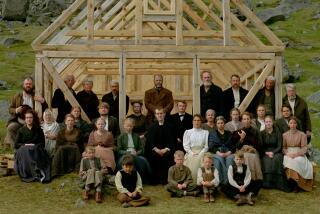More than just surviving
- Share via
“Mongol” may fool you: It’s a foreign-language film, yes, but it has enough appeal to pull in the same fanboy audience that made “300” a huge hit. Russian director Sergei Bodrov’s Oscar-nominated movie about the early life of Genghis Khan, which opens Friday, is thoroughly exotic, utterly romantic, beautifully shot and features some of the bloodiest, most astounding battles ever put on screen. It is -- no kidding -- totally cool. Not that the 59-year-old Bodrov recognized this during the film’s grueling shoot.
“When I was making this movie, it was a fight, a battle, a war, and I was thinking only how to survive,” says Bodrov in his thick accent. “I was thinking it was a fresh story, nobody had made a movie about this guy before, but when I was making it, I didn’t think about the future. Then when it was finished and I saw it for the first time, at the Toronto Film Festival, and I saw how people reacted, I thought, ‘This will be good for me.’ ”
Bodrov isn’t kidding with that war metaphor. Shooting in Mongolia, China and Kazakhstan wasn’t exactly like a day on the back lot. In fact, the production was initially suspended after nine weeks because, says the director, who spoke by phone from the Cannes Film Festival, “we didn’t have enough money, the weather conditions were bad, and [the production] was much bigger than we thought. So I said we would come back next year, and I was able to find more money and we were much more prepared to shoot the movie, and we did it right.”
Still, some locations were so remote that the film company had to build roads to get to them. When Bodrov needed 1,500 horses and riders for a battle sequence, he had to import them from Kazakhstan into China because, he says, “The Chinese, they can’t ride. You can’t use the Chinese army. You have to bring the people in with their own horses, then train them, because they’re not professional actors. So I brought people from Kazakhstan and they trained for two months.”
Tough shoots are nothing new for Bodrov. His other Oscar-nominated film (in the foreign-language category), 1996’s “Prisoner of the Mountains,” was filmed in the Russian republic of Dagestan, near the Chechnyan border, where Bodrov had to hire security to protect him from drug traffickers and other forms of local lowlife. “Mongol” was particularly special for Bodrov, however, because its challenges helped the director keep his mind off the 2002 death of his son, Sergei Jr. (star of “Prisoner of the Mountains”), who had been killed in an avalanche in the Caucasus while making a film. His death, says Bodrov, “was almost a reason for me to go to unknown places and do a big, tough movie and be really busy. I was busy for four years. I’m much more serious now, taking a different approach when I make my movies. I think each one could be my last.”
The story of the great Khan also resonated for Bodrov in a geopolitical sense. When the Mongol leader, who died in 1227, consolidated all the nomadic tribes in his homeland, he and his descendants wound up conquering a good portion of Eurasia, including most of modern-day Russia. “Genghis Khan is one of the most hated names in Russia,” says Bodrov. “We lived 200 years under Mongol rule and we still blame them for all our problems. People were shocked I was making a movie about him, but I said, ‘Good or bad, he’s part of our history.’ ”
Bodrov got it from both sides; contemporary Mongolians were not happy about a Russian making a film about their national hero. “It was a scandal, one I wasn’t ready for,” he says. “Genghis Khan’s name was forbidden in Mongolia for 70 years because of the Communists and because he was a Russian enemy. When everything collapsed, he became a living god. So for Mongolians, I’m coming -- and my intentions were very good -- but for them it was not good.” In fact, Bodrov was so concerned about negative reaction inside the country, he shot only landscapes there, then left.
If nothing else, the advance buzz for his latest work may give Bodrov a second chance at cracking the Hollywood inner circle. In 2000, he made “Running Free,” a children’s film for Columbia, but the results were disastrous -- Bodrov hints at unending studio interference but will say only that “it was not my best experience.”
Now, however, after “Mongol” has made the festival circuit, Bodrov says he is getting “a lot of offers, huge offers,” including the possibility of making a pirate movie or a film about the legendary Italian explorer Marco Polo. But Bodrov, who is used to making his own decisions, is no fool. He is not going to jump into the pool until he is certain he can swim.
“People like ‘Mongol’ because it’s an epic,” he says. “But I want to be very careful with projects and people.”
More to Read
Only good movies
Get the Indie Focus newsletter, Mark Olsen's weekly guide to the world of cinema.
You may occasionally receive promotional content from the Los Angeles Times.









